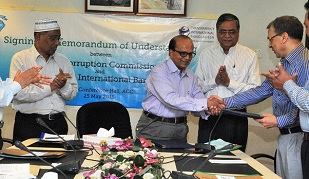Published: 25 May 2015
Transparency International Bangladesh (TIB) and the Anti-Corruption Commission (ACC) on 25 May 2015 signed a Memorandum of Understanding (MoU) with the objective of strengthening anti-corruption prevention activities in the country. At a simple ceremony held at the mini conference hall of ACC head office in Segunbagicha, TIB’s Executive Director Dr. Iftekharuzzaman and ACC’s Director General (DG), Dr. Md Shamsul Arefin signed the two-year MOU on behalf of their respective organizations. ACC Chairman Md. Badiuzzaman, two Commissioners, Secretary and senior officials of both TIB and ACC were present during the signing.During the signing ceremony, speakers agreed that the process of curbing corruption will be more dynamic and easy if the corruption can be prevented effectively. The MOU stipulates undertaking joint activities to implement and monitor anti-corruption campaigns at upazila and district levels involving members of Satata Sangha (integrity association) to aware people about corruption marking the International Anti-Corruption Day on December 9. Collaboration also covers the areas of research and campaign, including TIB’s two new initiatives: Report Corruption and Advice and Legal Advocacy Centre (ALAC), where ACC will take necessary measures in view of public complaints against corruption received through TIB.It may be mentioned here that TIB played the lead catalyst role in the enactment of the Anti-Corruption Act , 2004 and setting up of the Anti-Corruption Commission (ACC).
|
Along with ACC, TIB implemented a country wide anti-corruption campaign ‘Jago Manush – Wake up people’ in 2007-08, with ACC. Since 2009, it has been relentlessly campaigning for effective implementation of the Act and ensuring the independence of the ACC.
TIB played the lead catalyst role in the enactment of the Anti-Corruption Act , 2004 and setting up of the Anti-Corruption Commission (ACC). Along with ACC, TIB implemented a country wide anti-corruption campaign ‘Jago Manush – Wake up people’ in 2007-08, with ACCIn 2010, the Government initiated a process of changing certain provisions of the ACC Act 2004. TIB played a key leadership role in a successful campaign opposing the amendments and calling for the continued independence of the AAC. TIB’s research identified the key issues which were taken up by TIB and its partners both nationally and locally through CCC and Yes groups. It launched a signature and sms campaign, online petition, organized joint demonstrations with other CSOs and activists; presenting signatures of support and a memorandum countering the changes to the Prime Minister. |
|








